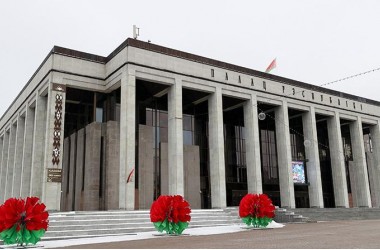Belarus calls on stakeholders to intensify international cooperation on Chernobyl. Belarusian Minister of Foreign Affairs Vladimir Makei's statement on the occasion of the 35th anniversary of the Chernobyl accident was read out by Belarus Permanent Representative to the UN Valentin Rybakov at the General Assembly's Special Commemorative Meeting on the Chernobyl Disaster, BelTA has learned.
Vladimir Makei stated that the Chernobyl accident resulted in a significant release of radioactive substances into the environment, which affected thousands of square kilometers of contaminated land in Belarus, changed the lives of hundreds of thousands of people and caused multi-billion damage to the economy of the country. Some 35% of Chernobyl fallout of radiocaesium on the European continent is located on the area of the country. That is why, the consequences of Chernobyl for Belarus are defined as a national environmental disaster.
“Over its sovereign years the country has done a lot to mitigate the consequences of Chernobyl. By 2021, the country has implemented five state programs with a total funding of $19.3 billion. Today, the priority of the state policy is to further reduce the risk of adverse health effects for people, especially children, living in the affected areas; to maintain the achieved level of protective measures in agriculture, forestry and water management; to promote recovery and sustainable social and economic development of regions while ensuring radiation safety requirements,” the minister said.
Belarus-initiated resolution Persistent Legacy of the Chernobyl Disaster, unanimously adopted at the 74th session of the UN General Assembly, recognizes the need to continue international cooperation on Chernobyl under the auspices of the organization. “We are counting on the further leading role of the UN in bringing together the international community and UN agencies, strengthening strategic partnerships, attracting innovation and investment for sustainable social and economic development of the affected areas,” the minister stressed.
Over 35 post-Chernobyl years Belarus has accumulated unique knowledge and experience of overcoming medical, social and economic consequences of the Chernobyl disaster. The country shares this knowledge and experience with partners and intends to actively support international Chernobyl cooperation, said Vladimir Makei.
An international conference on Chernobyl issues was held in Minsk on 20 April. Among the issues discussed at the conference was the development of an investment platform for the regions of Belarus affected by the accident. The platform was designed to unite investors and ensure the achievement of the Sustainable Development Goals in the most vulnerable regions.
“We call on all interested partners to intensify international cooperation on Chernobyl to promote the implementation of the 2030 Agenda for Sustainable Development in the affected regions and to overcome the long-term consequences of the COVID-19 pandemic, which will complement national efforts and positive results on environmental, social and economic recovery of territories “with a view of leaving no one behind,” Vladimir Makei said.








